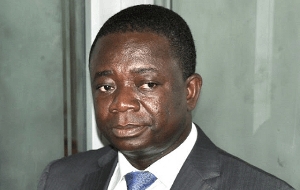- Home - News
- TWI News | TV
- Polls
- Year In Review
- News Archive
- Crime & Punishment
- Politics
- Regional
- Editorial
- Health
- Ghanaians Abroad
- Tabloid
- Africa
- Religion
- Election 2020
- Coronavirus
- News Videos | TV
- Photo Archives
- News Headlines
- Press Release
General News of Friday, 27 April 2007
Source: GNA
APRM is purely non-partisan - Prof. Asante.
Takoradi, April 27-GNA-The African Peer Review Mechanism (APRM) would not suffer in any way if there was a change of government, says Professor S. K. B. Asante, member of the Governing Council of the APRM. This, he said, was because the APRM Governing Council was entirely independent, purely non-partisan and worked within the tenets of the African Union (AU) for the common good of the country and the African continent as a whole.
Professor Asante was reacting to sentiments expressed by some participants attending a day's trainer-of-trainers workshop for the staff of the National Commission for Civic Education (NCCE) and District Focal Persons in the Western region at Takoradi on Thursday. "The APRM is not a political manifesto of any party to open a new or respectable chapter in the political and social life of the country", he said.
Prof. Asante said the APRM in collaboration civil society groups and other stakeholders to ensure the successful integration of programme of action into the Ghana Growth and Poverty Reduction Strategy (GPRS II).
To this end, a desk had been established to act as liaison between the President and the APRM Governing Council, he said. The Governing Council had prepared a popular version of Ghana's APRM Country report that would be translated into six major local languages and made accessible to the people.
Prof. Asante also said some tertiary institutions had incorporated the APRM into their programmes and described this as "heartwarming". He said the Governing Council had developed a monitoring and evaluation framework to monitor the progress of implementation by all stakeholders.
Dr. Francis Appiah, Executive Secretary, National APRM Governing Council told the participants that the APRM had made strides in assessing the state of economic management and corporate governance, among others.
He said it was time to involve the people from the grassroots in the monitoring of the implementation of action that must be national in character to benefit all.
"The uniqueness of the APRM is that it relies solely on the people and not politicians to assess the implementation of programmes". Dr. Appiah urged the people to support all deliberations of the APRM, which tries to mobilize the people to attain the highest level of the standard of living and development.
"Foreign or imposed socio-economic programmes had been a failure hence the need for the people to have a say in governance to make a move by tapping the ideas and experiences of ordinary people, he emphasized.
Mr. Kwaku Baa Owusu, NCCE Regional Director said areas of the APRM concept of democracy, good political and cooperate governance among others "are not any differen t from the constitutional pillars" that support Ghana's democracy.
He said, while everything was being done as a nation to achieve the best in every aspect of our national life, every citizen must be involved and encouraged to exhibit commitment, else "the fruits of good governance will continue to elude us".
Mr. Samuel Cudjoe, Principal Programme Officer, NAPRM Governing Council took participants through the functions of the district APRM Oversight Committees, highlights of the 2006 annual progress report and principles and objectives of the monitoring and evaluation of the implementation of the national programme of action. 27 April 07










